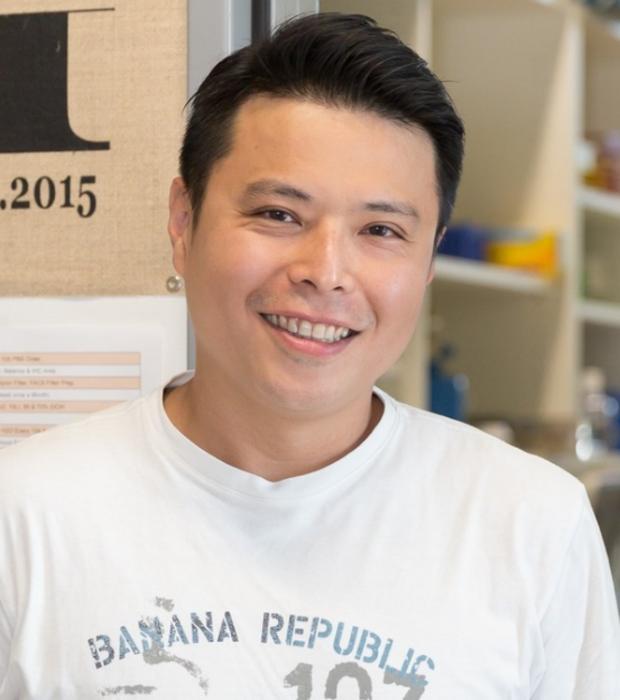AUGUST 23, 2024, NEW YORK – A Ludwig Cancer Research study has identified a metabolic switch in the immune system’s T cells that is essential to the generation of memory T cells—which confer lasting immunity to previously encountered pathogens—and a T cell subtype found in tumors that drives anti-tumor responses during immunotherapy.
AUGUST 23, 2024, NEW YORK – A Ludwig Cancer Research study has identified a metabolic switch in the immune system’s T cells that is essential to the generation of memory T cells—which confer lasting immunity to previously encountered pathogens—and a T cell subtype found in tumors that drives anti-tumor responses during immunotherapy.
Led by Ludwig Lausanne’s Ping-Chih Ho and Alessio Bevilacqua and published in the current issue of Science Immunology, the study identifies PPARβ/δ, a master regulator of gene expression, as that essential molecular switch. Ho, Bevilacqua and their colleagues also show that the switch’s dysfunction compromises T cell “memory” of previously encountered viruses as well as the induction of anticancer immune responses in mice.
“Our findings suggest that we might be able to engage this switch pharmacologically to improve the efficacy of cancer immunotherapies,” said Ho.
When killer (or CD8+) T cells, which kill sick and cancerous cells, are activated by their target antigen, they switch on metabolic pathways that most other healthy cells only use when starved of oxygen. This type of metabolism—involving a metabolic process known as aerobic glycolysis—supports multiple processes essential to the killer T cell’s ability to proliferate and destroy its target cells.
Most killer T cells die off after they’ve cleared an infection. A few, however, transform into central memory CD8+ T cells (Tcms) that linger in the circulation to establish what we call immunity: the ability to mount a swift and lethal response to the same pathogen if it is ever encountered again. To achieve this transformation, T cells switch off aerobic glycolysis and otherwise adapt their metabolism to persist over the long term in tissues or in the circulation. How precisely they do this was until now unknown.
Aware that PPARβ/δ activates many of the metabolic processes characteristic of Tcms, Ho, Bevilacqua and their colleagues hypothesized it might play a key role in Tcm formation. They examined immunologic gene expression data collected from yellow fever vaccine recipients long after vaccination and, as expected, saw that the PPARβ/δ was produced abundantly in their Tcms.
Their studies in mice revealed that PPARβ/δ is activated in T cells not in the peak phase of the immune response to viral infection but as that response winds down. Further, CD8+ T cells were unable to make the metabolic switch required to become circulating Tcms if they failed to express PPARβ/δ. Disrupting its expression impaired survival of such Tcms and resident memory T cells in the intestines following infection.
The researchers show that T cell exposure to interleukin-15—an immune factor important for Tcm formation—and their expression of a protein named TCF1 engages the PPARβ/δ pathway. TCF1 is already known to be critical to the rapid expansion of Tcms when they encounter their target pathogen. The researchers show in this study that it is also important to the maintenance of TCMs.
As it happens, TCF1 expression is a hallmark of a subset of CD8+ T cells—progenitor-exhausted T cells—that are found in tumors. These progenitor-exhausted T cells follow one of two paths: they either become completely lethargic, “terminally exhausted” T cells; or, given the appropriate stimulus, proliferate to produce “effector” CD8+ T cells that kill cancer cells. Checkpoint blockade immunotherapies, like anti-PD-1 antibodies, can provide such stimulus.
The observation that TCF1 modulates the PPARβ/δ pathway in T cells raised the possibility that it might also be essential to the formation and maintenance of progenitor-exhausted T cells. The researchers showed that this is indeed the case. Deleting the PPARβ/δ gene from T cells led to the loss of progenitor-exhausted T cells in a mouse model of melanoma. They also demonstrate that the PPARβ/δ pathway curtails the tendency of progenitor-exhausted T cells to stagger toward terminal exhaustion.
To assess the therapeutic potential of their findings, Ho, Bevilacqua and their colleagues exposed T cells to a molecule that stimulates PPARβ/δ activity and used the treated cells against a mouse model of melanoma. These cells delayed the growth of melanoma tumors in mice more efficiently than their untreated counterparts and bore biochemical hallmarks of progenitor exhausted T cells primed to generate cancer-killing descendants.
“Based on these findings,” said Bevilacqua, “we suggest that targeting PPARβ/δ signaling may be a promising approach to improve T cell-mediated anti-tumor immunity.
How exactly this might be achieved in people is a subject for further study that will doubtless be pursued by the Ho laboratory.
This study was supported by Ludwig Cancer Research, the Swiss National Science Foundation, the European Research Council, the Swiss Cancer Foundation, the Cancer Research Institute, Helmut Horten Stiftung, the Melanoma Research Alliance, the Taiwan Ministry of Science and Technology, the NYU Abu Dhabi Research Institute Award and Academia Sinica.
Ping-Chih Ho is a member of the Lausanne Branch of the Ludwig Institute for Cancer Research and a full professor at the University of Lausanne.
# # #
About Ludwig Cancer Research
Ludwig Cancer Research is an international collaborative network of acclaimed scientists that has pioneered cancer research and landmark discovery for more than 50 years. Ludwig combines basic science with the translation and clinical evaluation of its discoveries to accelerate the development of new cancer diagnostics, therapies and prevention strategies. Since 1971, Ludwig has invested nearly $3 billion in life-changing science through the not-for-profit Ludwig Institute for Cancer Research and the six U.S.-based Ludwig Centers. To learn more, visit www.ludwigcancerresearch.org.
For additional information please contact [email protected].
Journal
Science Immunology





